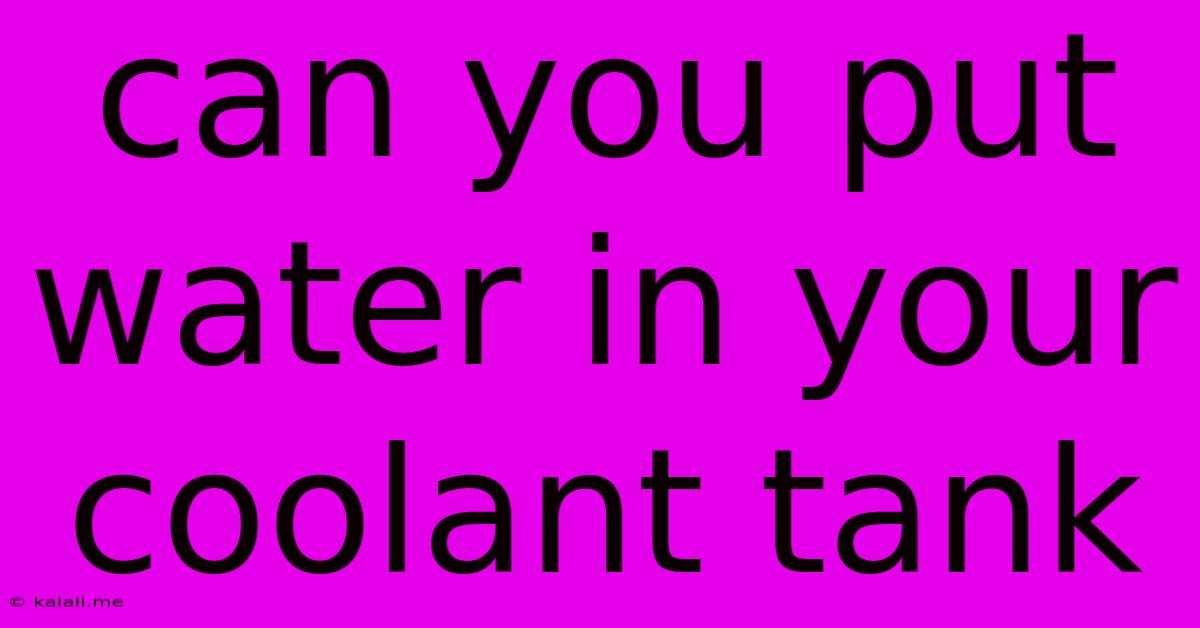Can You Put Water In Your Coolant Tank
Kalali
Jun 06, 2025 · 3 min read

Table of Contents
Can You Put Water in Your Coolant Tank? A Comprehensive Guide
Meta Description: Wondering if you can add plain water to your car's coolant tank? This guide explores the risks and benefits, explaining when it's acceptable and when it's a bad idea. Learn about coolant types, the importance of proper mixture, and how to avoid costly engine damage.
Adding water to your coolant tank might seem like a simple solution when your coolant level is low, but it's a decision that requires careful consideration. While it might seem like a quick fix, simply topping off with water can have serious consequences for your vehicle's engine. This comprehensive guide will delve into the specifics, helping you understand when it's acceptable and when it's absolutely not.
Understanding Coolant: More Than Just Water
Coolant, also known as antifreeze, is a crucial component of your car's cooling system. It's not just water; it's a mixture of water and specialized chemicals designed to prevent corrosion, lubricate the water pump, and, most importantly, prevent freezing in cold weather and boiling over in hot weather. These chemicals, typically ethylene glycol or propylene glycol, significantly raise the boiling point and lower the freezing point of the mixture compared to water alone.
The Risks of Using Only Water
Using only water in your coolant tank exposes your engine to several potential problems:
-
Corrosion: Water alone lacks the corrosion inhibitors present in coolant. This leads to rust and scaling inside your engine block, radiator, and other components of the cooling system. This corrosion can severely damage these parts over time, leading to expensive repairs or even engine failure.
-
Freezing: In colder climates, water will freeze, expanding and potentially cracking engine blocks, hoses, and other critical parts. This damage can be catastrophic and lead to a complete engine overhaul.
-
Boiling Over: Water has a lower boiling point than coolant. This means it can boil over more easily, especially during periods of high engine load, potentially leading to overheating and engine damage. Overheating can warp cylinder heads and damage pistons.
-
Reduced Lubrication: Coolant also provides lubrication to the water pump. Using only water reduces this lubrication, leading to premature wear and tear on the pump.
When is it Acceptable to Add Water?
There are very limited circumstances where adding water might be a temporary emergency measure:
-
Complete Coolant Loss: If you experience a significant coolant leak and have completely run out of coolant, adding water can prevent catastrophic overheating in a pinch. This is strictly a temporary measure to get you to a mechanic or parts store.
-
Minor Top-Off (with caveats): In rare cases, adding a small amount of clean, distilled water to top off the coolant level slightly might be acceptable if you're very close to the minimum line and can't immediately access coolant. However, this should only be done as an absolute last resort, and you must replace the mixture with the proper coolant/water mix as soon as possible.
The Importance of the Correct Coolant Mixture
Your vehicle's manufacturer specifies a particular coolant-to-water ratio. This is usually a 50/50 mix, but it's crucial to check your owner's manual for the precise recommendation. Using the incorrect mixture can negate the benefits of the coolant and increase the risks mentioned above.
Choosing the Right Coolant
Different coolants are available, often categorized by color (e.g., green, orange, pink). Do not mix different types of coolant. Using the wrong type can cause sludge and damage to your cooling system. Always check your owner's manual to ensure you use the correct type of coolant for your vehicle.
Conclusion: Prevention is Key
While adding water to your coolant tank might seem like a simple solution in an emergency, it’s generally not recommended. The risks of corrosion, freezing, and overheating far outweigh any short-term benefits. Regularly checking your coolant level and using the correct coolant mixture will help prevent costly repairs and maintain the health of your engine. If you're unsure about your coolant level or type, consult your owner's manual or a qualified mechanic.
Latest Posts
Latest Posts
-
How To Become A Light Sleeper
Jun 07, 2025
-
Gasoline And Frozen Orange Juice Concentrate
Jun 07, 2025
-
I Will Let You Know In Spanish
Jun 07, 2025
-
Send Someone Elses Code To Potential Employeer
Jun 07, 2025
-
You Will Have No Other Gods Before Me
Jun 07, 2025
Related Post
Thank you for visiting our website which covers about Can You Put Water In Your Coolant Tank . We hope the information provided has been useful to you. Feel free to contact us if you have any questions or need further assistance. See you next time and don't miss to bookmark.